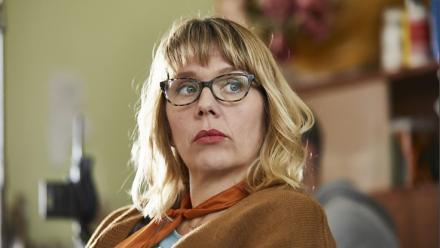
Comedian/actor Kerry Godliman is one of the stars of new BBC comedy PRU, set in a Pupil Referral Unit - a school for excluded pupils.
PRU is told through the eyes of four reckless young people who can’t help but say the unsayable and do the undoable.
Halil, Hanna, Jaden and Belle are four very different 15 year-olds, with one thing in common. They’ve all been 'perm’d' (permenatly excluded). Now, teetering on the edge of the education system, they’re negotiating Year 10 together, at their local PRU.
PRU’s authenticity comes from the writers’ and directors’ experience of working closely with young people in PRUs across London, over a period of years.
PRU, BBC Three, will be available on iPlayer from March 2 and will be broadcast on BBC One on Friday, March 5 at 11.35pm.
Interview with Kerry Godliman below
What can you tell us about PRU?
PRU is about a bunch of young people in a Pupil Referral Unit who have been excluded from mainstream education, and it showcases a world that isn't often seen.
What can you tell us about your character, Jean?
My character is a weary art teacher who has the best of intentions but is a little tired! She started the job with a sense of ‘I'm going to change the world and I'm going to pull out the best of these kids’. The reality of that world has slightly ground her down. However, she still wants the kids to do well and make them recognise their talents and abilities, even if they don't particularly want to see that.
How was your school experience like growing up?
Mostly okay! It’s interesting to reflect on education at the moment because a lot of parents like myself are having to do it with our kids. Oftentimes you don't really think about your own education, but now that I'm doing home schooling with my children, it makes you think, what was my education like?
I went to a comprehensive school that had previously been a secondary modern that my dad went to so weirdly, I went to the same school as my dad! I did what I needed to do, and I got what I needed, but I wouldn't say it was a great school.
Did you find any similarities between yourself and your character?
Maybe a little bit, due to the fact of feeling very hopeful and optimistic about what can be achieved in a sense of a community capacity but then being ground down by reality. I think, especially now, with the cuts that have been made to youth services, it makes me feel kind of sad that young people aren’t valued more through government funding.
When I was growing up, I used to go to a Youth Theatre which was publicly funded. I don't know how much of that is available for young people now. Also, friends of mine who are teachers and have been teaching for over a decade tell me that recent cuts have had such an impact on young people. A character like Jean just feels a bit ground down by austerity and financial cuts to young people services.
What was it like to work with the rest of the cast?
It was great because the cast were mainly young people with very little experience. There was a kind of rawness to their process which I found interesting. It was lovely to work with young people as they weren't jaded, and their positivity was really energising.
Were there any highlights during filming?
When we were workshopping we played warm-up games and exercises that I hadn’t done for 20 years since I was a drama student, so that was great. You don’t usually get a chance to do that in the professional world, so you start to forget the value of it until when you’re doing it and you think, oh yeah, this does warm us up and get us in the right headspace!
What drew you to the project?
The aspect of showing a world that isn't normally seen always interests me; with a lot of drama on TV there are often a lot of repeated scenarios in storytelling.
I haven't seen a piece of storytelling about young people that have been excluded from mainstream education for one reason or another and I'm always interested in showing worlds that aren't normally seen. This is a reality for thousands and thousands of families, so why don’t we get to see those stories more often?
What do you hope audiences can learn from the show?
I hope we can de-stigmatise these environments, pull them into the mainstream and discuss why they exist, how they exist, how people work, and what the objective is for those communities and the hopeful futures that those kids.
What can viewers expect and why should they tune in?
I think there is something about young people on TV that is fresh and energising as it is captivating, to watch young people at the very beginning of their lives. It’s all about identity and becoming who you are and when you're at the beginning of that journey as a young person, it is fascinating. In terms of a demographic, the kids in this programme are not a demographic that might have been seen before. So, audiences will be shown something they may not know or understand.
With a teenage daughter myself, it was really funny because the slang that's used by the students was slang that I have to live with! So, having characters on screen saying words like ‘leng’ and ‘fam’ made me laugh as I identify and live with these words. It's quite funny just seeing these characters speak in the vernacular that local teenagers around me speak.



